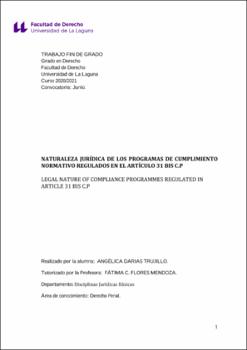Naturaleza Jurídica de los Programas de Cumplimiento Normativo regulados en el Artículo 31 bis C.P
Author
Darias Trujillo, AngelicaDate
2021Abstract
The criminal liability of legal persons was incorporated into the criminal
sphere through L.O 5/2010, which introduced a new article in the Spanish
Criminal Code, art. 31bis, a precept that regulates all the requirements that
must be met in order to attribute liability to the legal person. However, it
was not until the reform introduced by L.O 5/2015, when the legislator
decided to make an exhaustive regulation of regulatory compliance
programs, configuring them as an exonerating cause from that reform
onwards. However, this exonerating nature has been much discussed, both
doctrinally and jurisprudentially. A first pronouncement on the matter is
found in the Circular of the State Attorney General's Office 1/2016 dated 22
January. Subsequently, the Supreme Court incorporated an opinion in STS
29 February 2016, also ruling for the first time on the legal nature of these
programs, taking into consideration the previous pronouncement of the
Public Prosecutor's Office.
From them on, the doctrine has been pronounced on the basis of the criteria
adopted by both the Public Prosecutor's Office and the Supreme Court,
constructing different positions on the matter.
The aim of this paper is to specify the different positions on the legal nature
of these programs La responsabilidad penal de las personas jurídicas se incorpora en el ámbito
penal a través de la L.O 5/2010 mediante la cual se introduce un nuevo
artículo en el Código Penal español, el art 31bis, precepto en el que se
regulan todos los requisitos que han de darse para poder atribuir
responsabilidad a la persona jurídica. Sin embargo, no fue hasta la reforma
operada por la L.O 5/2015, cuando el legislador decide hacer una exhausta
regulación de los programas de cumplimiento normativo, configurándolos
como causa eximente a partir de dicha reforma. No obstante, esa naturaleza
eximente ha sido muy discutida, tanto doctrinal como jurisprudencialmente.
Un primer pronunciamiento acerca de ello lo encontramos en la Circular de
la Fiscalía General del Estado 1/2016 de fecha 22 de enero. Posteriormente,
el Tribunal Supremo incorpora una ober dicta en la STS 29 de febrero de
2016 pronunciándose también por primera vez acerca de la naturaleza
jurídica de estos programas, tomando en consideración el previo
pronunciamiento de la Fiscalía. A partir de ese momento, la doctrina se ha
ido pronunciando en base al criterio adoptado tanto por la Fiscalía como por
el Tribunal Supremo, construyendo diversas posturas al respecto.
Este trabajo tiene por objeto concretar las diversas posturas acerca de la
naturaleza jurídica de estos programas.





